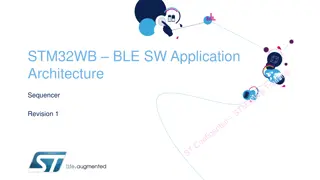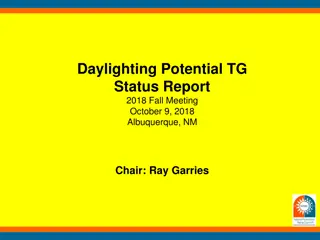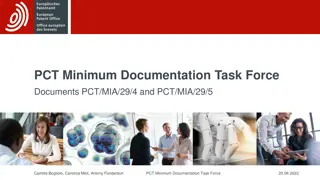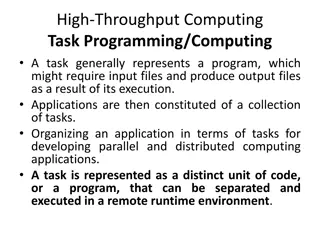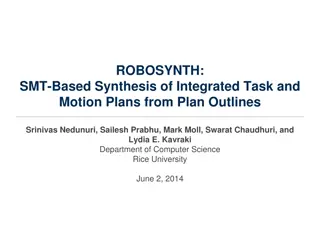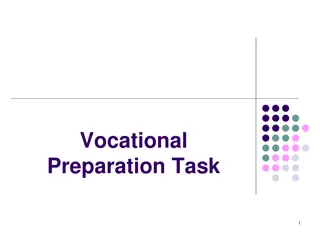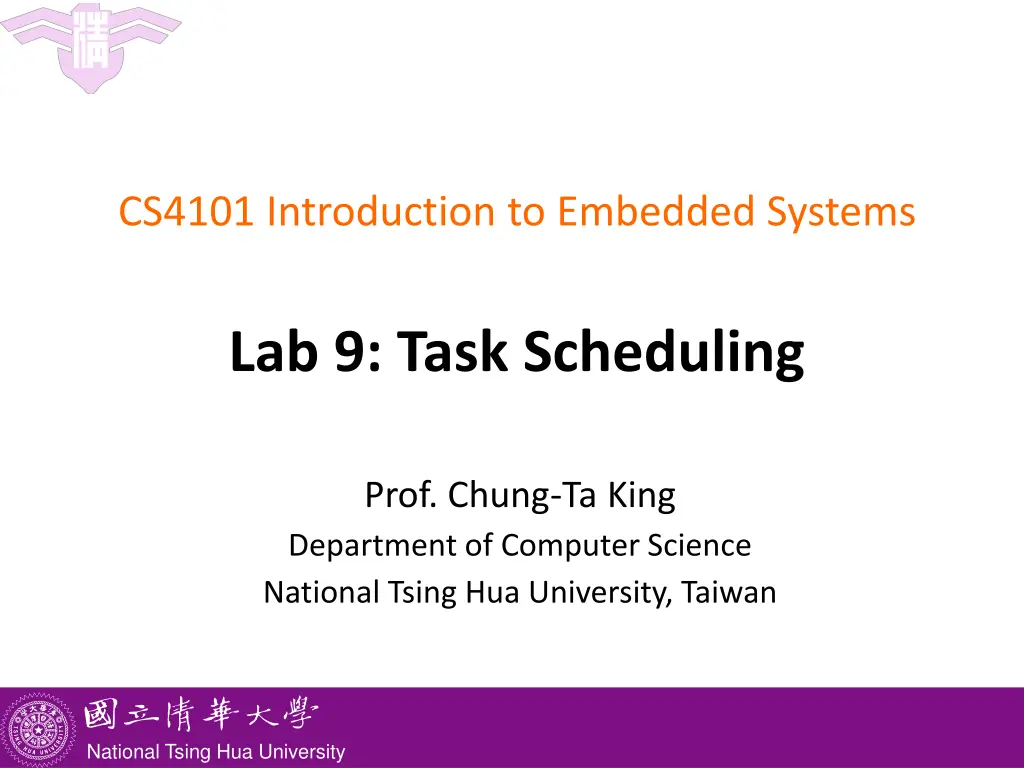
Task Scheduling in Embedded Systems Lab
Explore the concepts of MQX task scheduling and management in the Embedded Systems Lab at National Tsing Hua University, Taiwan. Learn about task creation, prioritization, and resource management to optimize system performance.
Download Presentation

Please find below an Image/Link to download the presentation.
The content on the website is provided AS IS for your information and personal use only. It may not be sold, licensed, or shared on other websites without obtaining consent from the author. If you encounter any issues during the download, it is possible that the publisher has removed the file from their server.
You are allowed to download the files provided on this website for personal or commercial use, subject to the condition that they are used lawfully. All files are the property of their respective owners.
The content on the website is provided AS IS for your information and personal use only. It may not be sold, licensed, or shared on other websites without obtaining consent from the author.
E N D
Presentation Transcript
CS4101 Introduction to Embedded Systems Lab 9: Task Scheduling Prof. Chung-Ta King Department of Computer Science National Tsing Hua University, Taiwan National Tsing Hua University
Introduction In this lab, we will learn Basic concepts of MQX tasks Scheduling and management of tasks 1 National Tsing Hua University
MQX Tasks Multiple tasks, created from same or different task template, can coexist MQX maintains each instance by saving its context: program counter, registers, and stack. Each task has an application-unique 32-bit task ID, which MQX and other tasks use to identify the task. A task is defined by its task descriptor: Task ID Context: program counter, stack, registers Priority Resources and task-specific parameters 2 National Tsing Hua University
Task Environment 3 National Tsing Hua University
Priorities Priorities run from 0 to N Priority 0: interrupts disabled, 1 highest priority N is set by the highest priority in MQX_Template_List Idle task runs at N+1 MQX creates one ready queue for each priority up to lowest priority priorities are consecutive Can change priority during runtime _task_set_priority() Any tasks at priority below 6 can mask certain levels of interrupts user tasks should start at 7 or above 4 National Tsing Hua University
Hello World 2 on MQX (1/2) #include <mqx.h> #include <bsp.h> #include <fio.h> /* Task IDs */ #define HELLO_TASK 5 #define WORLD_TASK 6 extern void hello_task(uint_32); extern void world_task(uint_32); const TASK_TEMPLATE_STRUCT MQX_template_list[] = { /* Task Index, Function, Stack, Priority, Name, Attributes, Parameters, Time Slice */ {WORLD_TASK, world_task, 1000, 9, "world", MQX_AUTO_START_TASK, 0, 0}, {HELLO_TASK, hello_task, 1000, 8, "hello", 0,0,0}, { 0 } }; 5 National Tsing Hua University
Hello World 2 on MQX (2/2) /* world_task:create hello_task & print " World " */ void world_task(uint_32 initial_data) { _task_id hello_task_id; hello_task_id = _task_create(0, HELLO_TASK, 0); if (hello_task_id == MQX_NULL_TASK_ID) { printf ("\n Could not create hello_task\n"); } else { printf(" World \n"); } _mqx_exit(0); } void hello_task(uint_32 initial_data) { printf("\n Hello\n"); _task_block(); } 6 National Tsing Hua University
Hello World 2 Explained When MQX starts, it creates world_task. The world_task creates hello_task by calling _task_create() with hello_task as a parameter. If _task_create() is successful, it returns the task ID of the new child task; otherwise, it returns MQX_NULL_TASK_ID. The new hello_task task has a higher priority than world_task, it becomes active and prints Hello . The world_task is then scheduled and prints World . 7 National Tsing Hua University
_task_create() _task_id _task_create( _processor_number processor_number, _mqx_uint template_index, uint_32 create_parameter) processor_number: # of the processor where the task is to be created or 0 if created on local template_index: index of the task template in the processor s task template list to use for the child task or 0 to use the template that create_parameter defines create_parameter: if template_index is not 0, then pointer to the parameters that MQX passes to the child task; otherwise pointer to the task template 8 National Tsing Hua University
Task States A task is in one of these logical states: Blocked: the task is blocked and is not ready, waiting for a condition to be true Active: the task is ready and is running because it is the highest-priority ready task Ready: the task is ready, but not running because it is not the highest-priority ready task 9 National Tsing Hua University
Task States Task Finishes Explicit Termination Active Blocking Call Higher-priority Task becomes Ready Time Slice Expires Interrupt comes in Blocked Terminated Context Switch Object Available Timeout Expires Task Starts Ready 10 National Tsing Hua University
Transitions between Task States Tasks can be automatically created when MQX starts; also, any task can create another task by calling _task_create() or _task_create_blocked() _task_create() puts the new task in the ready state and the scheduler runs the highest priority task If _task_create_blocked is used, the task is not ready until _task_ready() is called 11 National Tsing Hua University
Common Calls for Task Management Terminates the task after running its task exit handler and releasing its resources. _task_abort _task_create Allocates & starts (makes ready) a new task. _task_create_blocked Allocates a new task in the blocked state. _task_destroy Terminates task after freeing its resources. _task_errno Gets the task error code for the active task. _task_get_id Gets the task ID. _task_get_processor Gets processor # on which a task resides. Restarts a task at top of its function; keeps same task descriptor, task ID, task stack _task_restart 12 National Tsing Hua University
Task Creation Example void init_task(void) { _task_create(0,TASK_A,0); ... ... init_task is created when MQX starts {INIT_TASK, init_task, 1500, 11, "init", MQX_AUTO_START_TA SK, 0, 0}, _task_ready(Task_B); } void Task_A(void) { ... _task_create_blocked(0,TASK_B,0); ... _task_abort(TASK_A); } {TASK_A, Task_A, 1500, 10, Task A", 0, 0, 0}, {TASK_B, Task_B, 1500, 9, Task B", 0, 0, 0}, void Task_B(void) { ... _task_abort(TASK_B); } CPU Time 13 National Tsing Hua University
Task Scheduling 14 National Tsing Hua University
MQX Scheduling Policies FIFO: (default policy) Active task is the highest-priority task that has been ready for the longest Round Robin: Active task is the highest-priority task that has been ready for the longest without consuming its time slice The scheduler is explicitly called after a specified period of time, a time slice. Allows other tasks at same priority level to be active Tasks in an application may have combinations of FIFO and round-robin with different time slice values. Explicit: using task queues 15 National Tsing Hua University
Priority-Based FIFO Scheduling low priority high FIFO list of ready tasks Ready CPU processor time Scheduler active 16 National Tsing Hua University
Priority-Based FIFO Scheduling low priority high FIFO list of ready tasks Ready CPU Scheduler active processor time 17 National Tsing Hua University
Priority-Based FIFO Scheduling low priority high FIFO list of ready tasks Ready CPU processor time Scheduler active 18 National Tsing Hua University
Round-Robin Scheduling Task 1 75ms Same Priority Task 2 50ms Time Slice = 50ms Task 3 60ms time Ready Task1 Task1 Task3 Task2 Task3 150ms 100ms 200ms T0 50ms time 19 National Tsing Hua University
Context Switching A task A will stop running and call scheduler if: It calls a blocking function Its time slice expires (Round Robin) A higher priority task is made ready An interrupt occurs Then: Context of task A is stored Context of highest priority task in ready queue is restored Task A is put at the end of ready or wait queue, If called a blocking function, is put in wait queue Else is put back in ready queue 20 National Tsing Hua University
Preemption Preemption occurs when a higher-priority task becomes ready, and thus becomes active The previously active task is still ready, but is no longer the active task Occurs when: An interrupt handler causes a higher-priority task to become ready Active task makes a higher-priority task ready 21 National Tsing Hua University
Common Calls for Task Scheduling Moves active task to end of its ready queue, which yields the processor to the next ready task of equal priority. _sched_yield _task_block Blocks the task. _task_get_priority Gets a task's priority. _task_ready Makes a task ready. _task_set_priority Sets a task's priority. _task_start_preemption Re-enables preemption for the task. _sched_set_policy _sched_set_rr_interval Sets the scheduling policy. Sets the time slice in milliseconds. _sched_set_rr_interval_ticks Sets the time slice in tick time. 22 National Tsing Hua University
Board Support Package (BSP) 23 National Tsing Hua University
What is a Board Support Package? Startup code for the processor Initialize memory, clock, interrupt controller All the drivers needed with the proper settings 24 National Tsing Hua University
MQX BSP Initializes microprocessor and board Clocks, memory interface, core registers Defines board specific parameters Clocks, memory parameters, interrupt usage, driver parameters/enabling, MQX limits, IO pin definitions, ... Presents board-specific API to IO drivers and application Timer ISR functions used by MQX scheduler, IO pin initializations Installs and initializes device drivers (selected by user_config.h) 25 National Tsing Hua University
Use GPIO 26 National Tsing Hua University
Initialize LED #if defined BSP_LED1 #define PIN_LED1 GPIO_PIN_STRUCT pin_led1[] = { BSP_LED1, GPIO_LIST_END }; #endif PSP, BSP user_config.h 1 twrk60d100m User Config #define BSPCFG_ENABLE_GPIODEV 27 National Tsing Hua University
Turn on the LED /* open device for output */ port_file_led1 = fopen("gpio:write", (char *) NULL); /* add pins/signals to the existing file */ ioctl(port_file_led1, GPIO_IOCTL_ADD_PINS, &pin_led1 ); /* write logical 0 to all signals in the file (fast) */ ioctl(port_file_led1, GPIO_IOCTL_WRITE_LOG0, NULL ); 28 National Tsing Hua University
Initialize Button #if defined BSP_BUTTON1 #define PIN_BTN1 GPIO_PIN_STRUCT pin_btn1[] = { BSP_BUTTON1, GPIO_LIST_END }; #endif 29 National Tsing Hua University
Check Button Status /* open device for input */ port_file_btn1 = fopen("gpio:read", (char *) &pin_btn1 ); /* read status from the input device ioctl(port_file_btn1, GPIO_IOCTL_READ, (char *) &pin_btn1); 30 National Tsing Hua University
Create a New MQX Project 31 National Tsing Hua University
32 National Tsing Hua University
33 National Tsing Hua University
34 National Tsing Hua University
Basic Lab Create four tasks: main, print, LED1, and LED2, where LED1 and LED2 use the same task template. Main task initialized IO, creates print task, and yields CPU. Print task prints Hello, World! , delays 500, yields CPU. Main task checks whether button1 or button2 are pressed. If button1 (button2) is pressed, main task creates LED1 (LED2) task to blink red (green) LED until button1 (button2) is released. Hint: You may like to use functions such as _sched_yield(), _task_block(), and _task_ready() Set the priority of the tasks carefully National Tsing Hua University
Bonus Lab Modify Basic Lab to use the round robin scheduling and perform the same operations. Use the main task to monitor whether button1 and button2 are pressed and released. Then create or destroy LED1 and LED2 tasks accordingly. In other words, LED1 and LED2 only need to blink the LED periodically and do not need to check button status. Hint: set their priority and time slices properly 36 National Tsing Hua University





